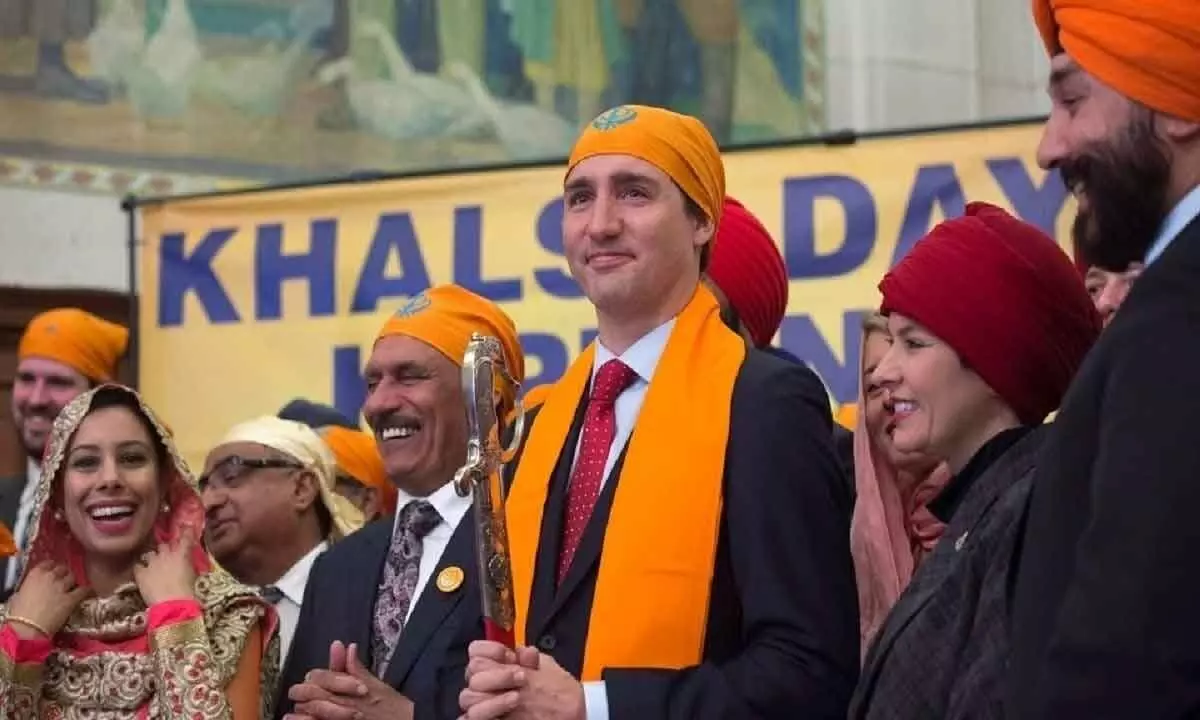Trudeau playing domestic politics on international turf
Diplomatic spats between nation-States are not uncommon, but when it happens between democracies where international relations become hostage to domestic politics - it is a cause for concern
image for illustrative purpose

Sikhs have come to wield more power than most of their immigrant counterparts. The next national elections are due in 2025, and Justin is playing up Sikh separatists, hoping to swing the community towards his party, in the upcoming 45th federal elections
Interference, accusations, “absurd,” and “motivated” are the new adjectives that are in play in the current Indo-Canadian relations as Canadian Prime Minister Justin Trudeau, who is at the forefront of an attack on Bharat’s internal affairs, is playing domestic politics on international turf for his political survival.
Accusing India within the Canadian parliament and following up by expelling an Indian emissary is a significant diplomatic move that has resulted in India’s counter-action, and the two diplomatic acts have further exacerbated the already strained relations between the two nations. However, this is not Trudeau’s first attempt to use India to prop his domestic politics, especially to win a section of the Canadian voter’s community.
Canadian Prime Minister Justin has been in the middle of various issues and controversies related to India during his time in office - some notable incidents or issues that were associated with tensions between Canada and India during Trudeau’s tenure are: 1. Jaspal Singh Atwal Controversy (2018): During a visit to India in 2018, Trudeau invited Jaspal Singh Atwal, an Indo-Canadian businessman who was convicted for his role in the attempt to assassinate a Punjab minister in 1986.
Atwal is a known Khalistani sympathiser and member of the now-banned militant group International Sikh Youth Federation. He was also involved in the attack of Ujjal Dosanjh, the 33rd Premier of British Columbia, who is a strong opponent of the Khalistani movement. Atwal presence at Canadian Prime Minister Justin Trudeau’s reception during a visit to India resulted in the souring of relations between the two countries. `
The damage was further deepened when the then Canadian National Security and Intelligence Advisor Daniel Jean alleged that ‘rogue elements’ in the Indian establishment tried to sabotage Trudeau’s visit.
2. Indian Farmers Protest: The Indian Farmers’ Protest, which began in late 2020 and continued into 2021, primarily revolved around new agricultural laws passed by the Indian government - however, the protest got unsolicited support from Trudeau, who expressed his support for the demonstration claiming that his country stood for “peaceful protests and the right to freedom of expression.” The Canadian PM even went on to express ‘concern’ for the well-being of the protesters and called for dialogue and a peaceful resolution to the issue. Trudeau was the first world leader to voice his views on the issue, and he took a stance challenging the Indian government. The Indian government condemned his statements as “an unacceptable interference in our internal affairs”.
3. Soft stance against Khalistan Movement: There has been a “new resurgence of Khalistani activism” under Trudeau’s leadership as he has avoided taking any strong measures against Khalistani separatists based in Canada, who have repeatedly targeted the Indian diaspora with an intent to create fissures among the Indian community, especially Hindus and Sikhs. Incidents like the Khalistan Posters in Ontario, promoting separatist movement seeking an independent Sikh State and attacks on temples have become common occurrences.
The underlying theme in the stance of Canadian Prime Minister Justin Trudeau is his attempt to gain the favour of the Khalistani faction, hoping to cash that into support from the Indian Sikh community, which numbers over 770,000.
Not to forget that in the 44th federal election held in September 2021, Trudeau had to seek support from Canada’s New Democratic Party (NDP) leader Jagmeet Singh - the “kingmaker” to stay in power as his Liberal Party has failed to secure a majority in elections. The Sikh community, which accounts for one per cent of Canada’s population, has elected Eighteen Sikh MPs to Canada’s 338-seat House of Commons. In the city of Woodstock, around 100 km from Toronto, a new neighbourhood has sprung up - “where 80 per cent of the inhabitants are Sikh.” Punjabi is the third-most spoken language in Canada, after English and French.
Sikhs have come to wield more power than most of their immigrant counterparts. The next national elections are due in 2025, and Justin is playing up Sikh separatists, hoping to swing the community towards his party, in the upcoming 45th federal elections.
According to local reports, Canadian Prime Minister Justin Trudeau is facing a “near-unprecedented” disapproval rating due to various internal issues such as high housing and living costs and inflation plaguing his country. Like all politicians, he needs to create distraction and diversion of national headlines, and the Khalistan story can give him that breathing space.
Diplomatic spats between nation-States are not uncommon, but when it happens between democracies where international relations become hostage to domestic politics - it is a cause for concern.
In democracies, public opinion, political debates, and electoral considerations often influence foreign policy decisions, but only a mature and secure leader can strike a balance between the two to pursue long-term foreign policy goals for the nation’s benefit.

